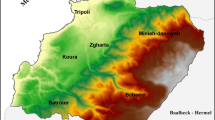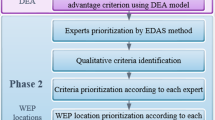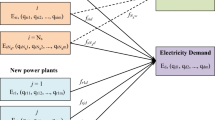Abstract
Today, the importance of the electricity industry as a major industry and its vital role in launching and exploiting other industries cannot be ignored. Therefore, long-term planning and forecasting are needed for its development. Therefore, in this study, a novel integrated scenario planning (SP) approach based on the multi-criteria decision-making (MCDM) method called I-MCDM-SP was presented. The proposed approach was applied in a case study to design scenarios for the Iranian electricity industry. In order to design the scenarios, different modes were considered for the two sectors of electricity generation and consumption. In this research, a SP method based on the cross-impact analysis and visualization methods was proposed, in which in order to design scenarios, key drivers (most important trends) should first be determined. Therefore, in this study, the analytic hierarchy process (AHP) model was used to select the most important trends. The results showed that for increasing, constant and decreasing modes of electricity consumption, "failure to correct the price of energy carriers," "laying down rules and regulations," and "improving the culture of energy consumption" with the weights of 0.337, 0.434, and 0.314 were selected as the best trends, respectively. To validate the proposed model, the AHP model was also compared with BWM and SWARA methods, which the results showed the accuracy of this model. Using this approach, four scenarios were designed that improvement and energy management scenarios were the most likely scenarios and sustainable development was the most optimistic scenario.









Similar content being viewed by others

References
Aghahosseini A, Bogdanov D, Ghorbani N, Breyer C (2018) Analysis of 100% renewable energy for Iran in 2030: integrating solar PV, wind energy and storage. Int J Environ Sci Technol 15:17–36
Amer M, Daim TU, Jetter A (2013) A review of scenario planning. Futures 46:23–40
Babaeian I, Erfani A, Entezari A, Baaghideh M (2017) Future Perspective of electricity consumption in Iran during the period 2011–2100 under climate change scenarios using downscaling of general circulation models. Geogr Environ Plan 27:131–144
Baležentis T, Streimikiene D (2017) Multi-criteria ranking of energy generation scenarios with Monte Carlo simulation. Appl Energy 185:862–871
Banik R, Das P, Ray S, Biswas A (2021) Prediction of electrical energy consumption based on machine learning technique. Electr Eng 103:909–920
Bhonsle JS, Junghare AS (2015) Application of MCDM-AHP technique for PMU placement in power system. In: 2015 IEEE international conference on computational intelligence & communication technology. IEEE, pp 513–517
Bianco V, Manca O, Nardini S (2009) Electricity consumption forecasting in Italy using linear regression models. Energy 34:1413–1421
Bishop P, Hines A, Collins T (2007) The current state of scenario development: an overview of techniques. Foresight 9(1):5–25. https://doi.org/10.1108/14636680710727516
Brauers J, Weber M (1988) A new method of scenario analysis for strategic planning. J Forecast 7:31–47. https://doi.org/10.1002/for.3980070104
Browne D, O’Regan B, Moles R (2010) Use of multi-criteria decision analysis to explore alternative domestic energy and electricity policy scenarios in an Irish city-region. Energy 35:518–528. https://doi.org/10.1016/j.energy.2009.10.020
Chaharsooghi SK, Rezaei M (2016) Prediction of Iran’s renewable energy generation in the fifth development plan. Int J Serv Oper Manag 25:120–133
Chaharsooghi SK, Rezaei M, Alipour M (2015) Iran’s energy scenarios on a 20-year vision. Int J Environ Sci Technol 12:3701–3718
Chang C-T, Zhao W-X, Hajiyev J (2019) An integrated smartphone and tariff plan selection for taxi service operators: MCDM and RStudio approach. IEEE Access 7:31457–31472
Chermack TJ (2004) Improving decision-making with scenario planning. Futures 36:295–309. https://doi.org/10.1016/S0016-3287(03)00156-3
Chung E-S, Kim Y (2014) Development of fuzzy multi-criteria approach to prioritize locations of treated wastewater use considering climate change scenarios. J Environ Manag 146:505–516
Frei C, Whitney R, Schiffer H-W, et al (2013) World energy scenarios: composing energy futures to 2050. Conseil Francais de l’energie
Golfam P, Ashofteh P-S, Rajaee T, Chu X (2019) Prioritization of water allocation for adaptation to climate change using multi-criteria decision making (MCDM). Water Resour Manag 33:3401–3416
Goodwin P, Wright G (2001) Enhancing strategy evaluation in scenario planning: a role for decision analysis. J Manag Stud 38:1–16
Hashemkhani Zolfani S, Maknoon R, Zavadskas EK (2016) Multiple attribute decision making (MADM) based scenarios. Int J Strateg Prop Manag 20:101–111
Iranian Electric Power Industries Forecasting Studies|Alireza Asadi|Research Project. https://www.researchgate.net/project/Iranian-Electric-Power-Industries-Forecasting-Studies. Accessed 1 Oct 2020
Kalbar PP, Karmakar S, Asolekar SR (2012) Selection of an appropriate wastewater treatment technology: a scenario-based multiple-attribute decision-making approach. J Environ Manag 113:158–169
Kalbar PP, Karmakar S, Asolekar SR (2013) The influence of expert opinions on the selection of wastewater treatment alternatives: a group decision-making approach. J Environ Manag 128:844–851
Karbassi AR, Abduli MA, Mahin Abdollahzadeh E (2007) Sustainability of energy production and use in Iran. Energy Policy 35:5171–5180. https://doi.org/10.1016/j.enpol.2007.04.031
Kavaklioglu K (2011) Modeling and prediction of Turkey’s electricity consumption using support vector regression. Appl Energy 88:368–375
Keyghobadi M, Shahabi SHR, Seif M (2020) Application of MCDM methods in managerial decisions for identifying and evaluating future options: a real case study in shipbuilding industry. J Ind Syst Eng 13:262–286
Khosroshahi KA, Jadid S, Shahidehpour M (2009) Electric power restructuring in Iran: achievements and challenges. Electr J 22:74–83. https://doi.org/10.1016/j.tej.2009.01.002
Kylili A, Christoforou E, Fokaides PA, Polycarpou P (2016) Multicriteria analysis for the selection of the most appropriate energy crops: the case of Cyprus. Int J Sustain Energ 35:47–58
Maliki OS, Agbo AO, Maliki AO et al (2011) Comparison of regression model and artificial neural network model for the prediction of electrical power generated in Nigeria. Adv Appl Sci Res 2:329–339
Marzouk M, Amer O, El-Said M (2013) Feasibility study of industrial projects using Simos’ procedure. J Civ Eng Manag 19:59–68
Mollaei S, Amidpour M, Sharifi M (2019) Analysis and development of conceptual model of low-carbon city with a sustainable approach. Int J Environ Sci Technol 16:6019–6028
Montibeller G, Gummer H, Tumidei D (2006) Combining scenario planning and multi-criteria decision analysis in practice. J Multi-Crit Decis Anal 14:5–20
Oppenheimer P (1990) The new Europe and the middle east: scenarios for energy planning. Energy Policy 18:798–805. https://doi.org/10.1016/0301-4215(90)90058-C
Panklib K, Prakasvudhisarn C, Khummongkol D (2015) Electricity consumption forecasting in Thailand using an artificial neural network and multiple linear regression. Energy Sources Part B 10:427–434
Rahman MN, Esmailpour A (2015) An efficient electricity generation forecasting system using artificial neural network approach with big data. In: 2015 IEEE first international conference on big data computing service and applications. IEEE, pp 213–217
Raturi AK (2016) Renewables 2016 global status report. http://www.ren21.net/. Accessed 2 Oct 2020
Razini S, Moghadastafreshi SM, Bothaei SM (2010) Scenario planning with the aim of future study on Iran power generation industry. Iran J Energy 13:85–99
Rezaei M, Babazadeh R (2021) Integrated strategic and tactical planning of non-edible biomass-to-biofuel supply chains. Int J Renew Energy Resour 9:33–44
Rezaei M, Chaharsooghi SK, Kashan AH, Babazadeh R (2020a) A new approach based on scenario planning and prediction methods for the estimation of gasoil consumption. Int J Environ Sci Technol 17:3241–3250
Rezaei M, Chaharsooghi SK, Kashan AH, Babazadeh R (2020b) Optimal design and planning of biodiesel supply chain network: a scenario-based robust optimization approach. Int J Energy Environ Eng 11:111–128
Ribeiro F, Ferreira P, Araújo M (2013) Evaluating future scenarios for the power generation sector using a multi-criteria decision analysis (MCDA) tool: the Portuguese case. Energy 52:126–136
Roozbahani A, Ebrahimi E, Banihabib ME (2018) A framework for ground water management based on bayesian network and MCDM techniques. Water Resour Manag 32:4985–5005
Saaty TL (1980) The analytic hierarchy process. McGraw-Hill, New York, p 324
Sadeghi H, Naseri A, Shahriari L (2013) Examination of the factors affecting the efficiency of gas power plants. Iran Energy Econ 2:93–107
Sarkodie SA (2017) Estimating Ghana’s electricity consumption by 2030: an ARIMA forecast. Energy Sources Part B 12:936–944
Sawicka H, Zak J (2014) Ranking of distribution system’s redesign scenarios using stochastic MCDM/A procedure. Procedia Soc Behav Sci 111:186–196
Seiti H, Hafezalkotob A, Najafi SE, Khalaj M (2019) Developing a novel risk-based MCDM approach based on D numbers and fuzzy information axiom and its applications in preventive maintenance planning. Appl Soft Comput 82:105559
Spyridonidou S, Vagiona DG (2020) Spatial energy planning of offshore wind farms in Greece using GIS and a hybrid MCDM methodological approach. Euro-Mediterr J Environ Integr 5:1–13
Štreimikienė D, Šliogerienė J, Turskis Z (2016) Multi-criteria analysis of electricity generation technologies in Lithuania. Renew Energy 85:148–156
Supriyasilp T, Pongput K, Boonyasirikul T (2009) Hydropower development priority using MCDM method. Energy Policy 37:1866–1875
Talebi M, Majnounian B, Makhdoum M et al (2019) A GIS-MCDM-based road network planning for tourism development and management in Arasbaran forest. Iran Environ Monit Assess 191:1–15
Witt T, Dumeier M, Geldermann J (2020) Combining scenario planning, energy system analysis, and multi-criteria analysis to develop and evaluate energy scenarios. J Clean Prod 242:118414
Zamani R, Ali AMA, Roozbahani A (2020) Evaluation of adaptation scenarios for climate change impacts on agricultural water allocation using fuzzy MCDM methods. Water Resour Manag 34:1093–1110
Zheng Z, Chen H, Luo X (2019) Spatial granularity analysis on electricity consumption prediction using LSTM recurrent neural network. Energy Procedia 158:2713–2718
Zolfani SH, Chen I-S, Rezaeiniya N, Tamošaitienė J (2012) A hybrid MCDM model encompassing AHP and COPRAS-G methods for selecting company supplier in Iran. Technol Econ Dev Econ 18:529–543
Acknowledgements
The authors thank Tavanir Company and Iran Ministry of Energy for provision of data and other relevant information.
Funding
There is no funding for this research.
Author information
Authors and Affiliations
Corresponding author
Ethics declarations
Conflict of interest
The authors declare that there is no conflict of interest.
Additional information
Editorial responsibility: Dai-Viet N. Vo.
Rights and permissions
About this article
Cite this article
Khademi, M., Rezaei, M. Designing long-term scenarios for Iranian electricity sector: a novel integrated scenario planning approach based on MCDM method. Int. J. Environ. Sci. Technol. 19, 9703–9718 (2022). https://doi.org/10.1007/s13762-022-04168-x
Received:
Revised:
Accepted:
Published:
Issue Date:
DOI: https://doi.org/10.1007/s13762-022-04168-x



